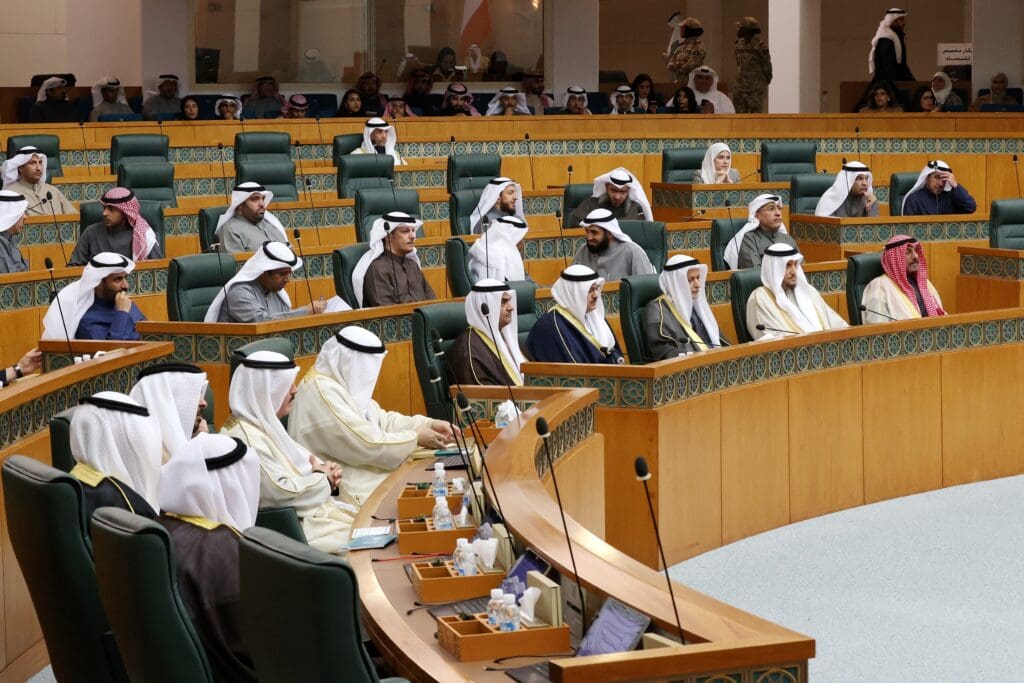Kuwait’s Emir Sheikh Meshal al-Ahmad al-Sabah, who came to power late last year, recently nominated Sheikh Sabah al-Khalid al-Sabah as crown prince and appointed a new cabinet. This came after the leader’s decision to dissolve the country’s National Assembly and institute a four-year suspension of several constitutional articles following an election that saw minimal changes to the parliament’s composition. In this interview with Afkār, Dania Thafer, an expert on Gulf geopolitics, analyzes the potential impacts of these moves on Kuwait’s domestic and foreign policy.
What factors prompted the Emir of Kuwait to dissolve and suspend the Kuwaiti National Assembly?
Kuwait is home to the Gulf’s oldest and most vibrant legislature, but frequent political deadlock has led to decades of cabinet reshuffles and parliamentary dissolutions. The most recent extended dissolution of Kuwait’s Parliament and suspension of constitutional articles by Kuwait’s emir, Sheikh Meshal al-Ahmad al-Sabah, can be attributed to a lack of state autonomy to conduct necessary economic reforms.A substantial part of the economic decay stems from ongoing gridlock between the appointed cabinet and members of Kuwait’s parliament. Additionally, disagreements over ministerial appointments have further exacerbated frustrations.
It is important to note that this dissolution and suspension occur at a time when other Gulf Cooperation Council states are rapidly reforming their economies to achieve well-articulated sets of national goals, while Kuwait has significantly lagged behind economically. In this context, the emir is correct in emphasizing that economic reform is a national security imperative. But it remains questionable if Kuwait can overhaul its economy in the span of four years or less.
The Emir of the State of Kuwait announced his vision regarding the new government’s capability in the public sector and the necessary economic reforms.
Overhauling Kuwait’s economy will be a formidable challenge. While parliamentary issues have significantly contributed to Kuwait’s economic lag, there are broader systemic challenges that the government must address to achieve meaningful reform. Historically, the dissolution of Kuwait’s parliament for extended periods in 1976 and 1986 did not result in significant progress in economic reforms in Kuwait. However, the urgency for reform is much greater today than it was in the 1970s and 1980s, driven by a large youth population, the pressing need for energy transition, and rapid technological advancements.
Achieving effective governance will necessitate bolstering governance structures and increasing accountability. This would reflect a resolute commitment to eradicating corruption, which remains a pervasive issue in Kuwait and extends beyond the parliamentary sphere. Additionally, the government of Kuwait operates with a much lower degree of state autonomy over the private sector compared to other Gulf states, limiting its ability to implement state-led reforms. These factors collectively hinder Kuwait’s ability to overhaul its economy in the same way other Gulf states have managed to do.
Kuwait’s New Domestic Policy and Its Relations with GCC Countries
It can be argued that Kuwait’s extended dissolution of the parliament is part of a broader regional and global trend. It signals a decline of liberalism and a change in norms worldwide. The United States’ conspicuous silence on Kuwait’s parliamentary affairs implies a profound shift. Once having the luxury to advance its soft power through democracy promotion, the U.S. now appears preoccupied with clinging to hard power irrespective of the consequences.
Regionally, Kuwait has long enjoyed robust and amicable relations with fellow GCC members. Kuwait’s leadership has skillfully maintained excellent ties with other Gulf states, transcending political differences. Therefore, the dissolution of the parliament or the suspension of the constitution is unlikely to alter this dynamic. In fact, this move is likely to be viewed favorably by other Gulf states, and they will probably continue to support this change, as Kuwait’s potent parliament did not align with other Gulf states’ visions of political governance.


